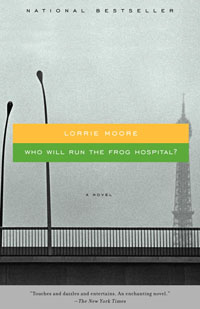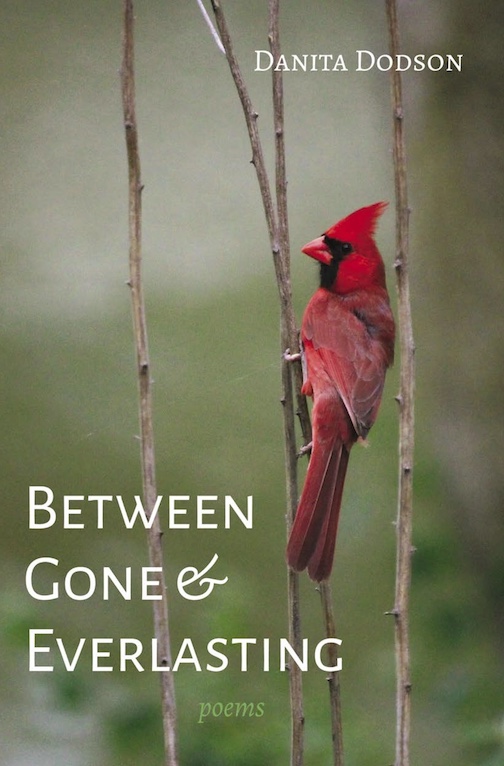Still Discovering
Lorrie Moore talks with Chapter 16 about the “excitements and difficulties” of writing fiction
Lorrie Moore’s most recent novel, A Gate at the Stairs (2009), begins as its narrator, Tassie—a Midwestern college student—is reflecting on the disappearance of birds. “I did not want to think about what happened to them,” she says. “Or rather, that is an expression—of politeness, a false promise of delicacy—for in fact I wondered about them all the time: imagining them dead, in stunning heaps in some killing cornfield outside of town, or dropped from the sky in twos and threes for miles down along the Illinois state line.”
This gruesome, enigmatic ambiguous image is vintage Moore. Young Tassie is both cynical and innocent, delicate ingénue and steely heroine. The world in which she comes of age—the post-9/11 world—has been forever altered by the image of flight as perilous and tragic—planes flying into buildings, bodies falling from the sky. Among Lorrie Moore’s many gifts is her mastery of image, rendering mood and sensibility with a graceful understatement that creeps over her readers, making the inevitable conflicts that unfold upon her characters feel like revelations of a knowledge attained unconsciously.
 No American writer still at work is more obviously influential than Lorrie Moore. With Self-Help—a wry, simultaneously earnest and ironic collection of stories that not-so-gently ridicules the zeitgeist of the 1980s—Moore took perhaps permanent ownership of the second-person voice, inspiring at least two students in every creative-writing workshop in America to write a story beginning with the word “You.” With “People Like That Are The Only People Here: Canonical Babbling in Peed-Onk,” from Birds of America (1998), Moore drew on personal experience to write the definitive account of the terror and grief experienced by families with children stricken by cancer (the “Peed-Onk” of the title refers to a Pediatric Oncology ward) in a tone all the more harrowing for its matter-of-fact directness and lack of sentimentality.
No American writer still at work is more obviously influential than Lorrie Moore. With Self-Help—a wry, simultaneously earnest and ironic collection of stories that not-so-gently ridicules the zeitgeist of the 1980s—Moore took perhaps permanent ownership of the second-person voice, inspiring at least two students in every creative-writing workshop in America to write a story beginning with the word “You.” With “People Like That Are The Only People Here: Canonical Babbling in Peed-Onk,” from Birds of America (1998), Moore drew on personal experience to write the definitive account of the terror and grief experienced by families with children stricken by cancer (the “Peed-Onk” of the title refers to a Pediatric Oncology ward) in a tone all the more harrowing for its matter-of-fact directness and lack of sentimentality.
Moore is also the author of three acclaimed novels—most recently, A Gate at the Stairs (2009), her first publication in over a decade, which traces the coming of age of Tassie, the precocious college student who works as a nanny for a troubled couple. With the irresistible appeal of its narrator and the breadth of themes, ranging from Bush-era complacence to the delicate politics of raising an African-American child in a Caucasian household to the universal entanglements of life, love, and identity on the verge of adulthood, A Gate at the Stairs further cements Moore’s place in the highest echelon of American writers.
In advance of her visit to Vanderbilt University in Nashville, Lorrie Moore answered questions for Chapter 16 via email.
 Chapter 16: When A Gate at the Stairs was published, you told NPR that you set the novel around the events of September 2001 and the subsequent invasion of Iraq to explore “themes of passivity and acquiescence, both in the personal and the public realm.” Since then, Barack Obama won the presidency on a campaign of hope and activism (“yes, we can!”), and, just a few weeks ago, declared an official end to the war in Iraq. Has the national mood changed, in your view, or is the condition you sought to examine in your novel persistent?
Chapter 16: When A Gate at the Stairs was published, you told NPR that you set the novel around the events of September 2001 and the subsequent invasion of Iraq to explore “themes of passivity and acquiescence, both in the personal and the public realm.” Since then, Barack Obama won the presidency on a campaign of hope and activism (“yes, we can!”), and, just a few weeks ago, declared an official end to the war in Iraq. Has the national mood changed, in your view, or is the condition you sought to examine in your novel persistent?
Moore: Well, yes and no, I suppose. I think the novel did assume a country and a decade in which a black man would not be elected president, but, boy, 2008 was an amazing year. I miss it! That said? No one halfway alert believes we have entered a “post-racial society” and we have many issues here in the ostensibly liberal Madison [Wisconsin] currently going on that are very much like the world depicted in the novel. I cannot speak for the national mood, as I feel such a thing is always somewhat of an invention.
Chapter 16: Both A Gate at the Stairs and your most famous short story, “People Like That Are the Only People Here,” contain very personal elements, but you’ve always stressed that your stories are works of fiction. How do you manage the tension between memoir/autobiography and fiction inspired by life experience?
Moore: Tension is always best managed by exercise, diet, and sleep. But I do not have any tension between memoir and fiction, since I don’t write memoir. So in that way, it’s easily managed.
 Chapter 16: You came to prominence at a very young age with your first collection, Self-Help, and your first novel, Who Will Run the Frog Hospital?, centers on the friendship of two adolescent girls. A Gate at the Stairs features a young, female narrator—one who is somewhat reminiscent of the narrators of your early work—peering in on the life of a woman nearing middle age, on the verge first of an adoption and then of a painful divorce. In writing the novel, did you have the sense of observing or commenting on your adult self from the perspective of the precocious young ingénues who appear in your early work?
Chapter 16: You came to prominence at a very young age with your first collection, Self-Help, and your first novel, Who Will Run the Frog Hospital?, centers on the friendship of two adolescent girls. A Gate at the Stairs features a young, female narrator—one who is somewhat reminiscent of the narrators of your early work—peering in on the life of a woman nearing middle age, on the verge first of an adoption and then of a painful divorce. In writing the novel, did you have the sense of observing or commenting on your adult self from the perspective of the precocious young ingénues who appear in your early work?
Moore: Well, my first novel was about a thirty-four-year-old woman, and I was only in my twenties when I wrote it. This was Anagrams. I don’t feel that in writing any novel that I am observing myself. I’m imagining others.
Chapter 16: Though you have written three acclaimed novels, you are best known as a practitioner of the short story. Do you prefer one form over the other, or does the story seek its own form?
Moore: They each have their excitements and their difficulties. I’m still discovering things about each of these genres.
Chapter 16: You took a long break between books, no doubt at least in part because of the demands of a teaching career and the full-time job of single parenting. Did you feel anxious about the time it took to write the book? With all of your acclaim, do you still feel pressure to publish?
Moore: No. Sometimes I wish I felt more. I do have bills to pay. But I like things lingering on my desk. One becomes a writer because one actually enjoys spending time with fictional characters.
Lorrie Moore will appear at Vanderbilt University in Nashville on January 19. A reception will be held in the Central Library Lobby at 4:30 p.m., followed by Moore’s talk at 5:30 in the Library Community Room. Both events are free and open to the public.





